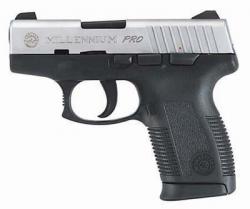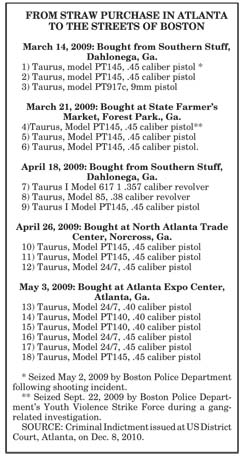January 5, 2011
As the city struggles to contain a dramatic spike in gun violence, 18 handguns bought through an illegal straw purchase in Georgia in 2009 are believed to have wound up on the streets of Boston. So far two of the 18 handguns have been recovered by Boston Police officers, but, according to investigators the others are believed to be hidden here.
 Taurus HandgunThe handguns, all Taurus pistols and revolvers are preferred by gangbangers and street criminals because their deadly-powerful punch and their small size make it very easy to conceal.
Taurus HandgunThe handguns, all Taurus pistols and revolvers are preferred by gangbangers and street criminals because their deadly-powerful punch and their small size make it very easy to conceal.
The guns were bought, law enforcement officials say, over a two-month period in 2009 by two men whose criminal records prevented them from making the purchases personally; instead, they paid “straws,” in this case two women, to buy the weapons for them. According to a federal indictment handed down last month in Atlanta, the transactions took place without a hitch, and within weeks the guns were wreaking havoc on the streets of Boston.
Despite increased manpower, despite resources targeted at illegal gun trafficking, and despite such proven results as the annual seizure of about 600 weapons and the jailing of more than 100 persons a year in Boston for illegal possession and/or trafficking in guns, the grimmest reality remains: Gun violence in the city of Boston is edging up; 264 people were killed or wounded by gunfire in the city in 2010, a 17 percent increase over 2009. Murder by gunfire went up even more, from 35 in 2009 to 58 last year, an increase of some 60 percent.
Among the casualties in 2009 was a man who was wounded in Boston on May 2 by a gunman using one of the Taurus handguns bought in the straw purchase in Atlanta seven weeks before.
That the purchase took place in Georgia is not happenstance. According to investigators, most of the guns used in crimes and seized in Boston were originally purchased in the states of Georgia, New Hampshire, Maine, and Vermont, none of which requires full background checks on those who purchase either handguns or rifles, according to the US Bureau of Alcohol, Tobacco, Firearms and Explosives.
While investigators are still trying to determine the specific route and identity of individuals responsible for bringing the Taurus handguns from Georgia to Boston, the legal loopholes – and the lack of broad and effective national regulatory mechanisms – that allowed them to bring the weapons here are far too familiar to police and gun control advocates. Until these gaps in the law are closed, and enhanced regulations put in place, advocates contend, police and ATF agents face a near impossible task in trying to stop the illegal flow of handguns to gang members and others intent on violence. They include:
No background checks: In more than half the states in the country, 33 to be exact, no background check is required when an individual buys a gun. The only requirement for licensed firearm dealers in those states is that they check an FBI database to determine that the purchaser is not a felon and has not been placed in a mental institution. In states like Massachusetts, complete background checks are required before an individual can purchase a gun from a federally licensed firearm dealer. Such checks, performed by local police departments, can take days on end to complete and are meant to assure that buyers are who they say they are.
In New Hampshire, where the federally licensed dealer need only check the FBI database, the review customarily takes 15 minutes. A case in point: Had New Hampshire required a more rigorous process, Philip Markoff might not have been able to purchase the 9mm, semi-automatic handgun he bought from a Mason, N.H., gun shop that he later used to kill Julissa Brisman in a Boston hotel room. Markoff used another person’s driver’s license and a notarized statement saying he had taken residence in New Hampshire to comply with a federal law that prohibits dealers from selling handguns directly to out-of-state residents.
Although the dealer who sold Markoff the gun was not prosecuted, investigators said that a more thorough check of the buyer’s documents – like the review mandated in Massachusetts – would have shown they were fraudulent. “You wouldn’t have been able to do this in Massachusetts,” John Rosenthal, head of Stop Handgun Violence, a Newton-based group, said at the time. ``That’s why he went to New Hampshire.”
In a recent interview with the Reporter, Rosenthal added: “The vast majority of guns used by criminals are sold by federally licensed gun dealers operating out of gun stores and private dealers who legally sell guns at gun shows or out of their backpacks and car trunks without having to run background checks or detection by law enforcement. If Congress wanted to reduce gun violence, it would enact national mandatory criminal background checks for all guns sales in all states, and support, versus tie up, law enforcement’s hands.”
Private sales of handguns not recorded: Federally licensed firearms dealers must maintain records of all retail sales they make to customers, records that provide the beginning of a trail for ATF agents to track how a handgun wound up being used in a crime. This painstaking investigative process is conducted every time a handgun that has been used in a crime is seized by Boston Police.
However, the tracking process is frustrated by the loophole in the federal gun control laws that excuses private individuals from having to keep records on weapons sales they have made. Most guns used in crimes were purchased more than three years before they were seized, according to a 2000 federal study, so a typical handgun may be sold several times among private individuals before being used in a crime. Tracking the path of a gun to a crime to determine if the person who sold the criminal the weapon can be prosecuted for illegal trafficking, or to determine if other weapons were sold along with the one that was seized. usually proves to be a mission impossible.
The Boston office for the ATF has eight agents assigned full-time to work with Boston police to track illegal trafficking in handguns. That initiative was enhanced recently when Boston Police Commissioner Edward Davis assigned two Boston detectives and a sergeant to work directly with the ATF agents and the group supervisor, Thomas E. D’Ambrosio.
 ATF Agent Thomas E. D’AmbrosioIn a recent interview, D’Ambrosio spoke of how difficult it is to track the ownership of a crime gun to determine how it wound up in a criminal’s hands.
ATF Agent Thomas E. D’AmbrosioIn a recent interview, D’Ambrosio spoke of how difficult it is to track the ownership of a crime gun to determine how it wound up in a criminal’s hands.
“There are no computerized records. This is all old-fashioned police work. Someone knocking on the front door and saying ‘in 1978, you bought this weapon from Colman’s Sporting Goods,’ which is now out of business, and ask them. ‘Do you know what you did with it.’ Sometimes people will have a record. Others will say, ‘My house was broken into and I don’t know what happened to it.’”
D’Ambrosio’s agents were instrumental in busting Stanley Jenkins, a Roslindale resident affiliated with a Dorchester gang, who had found the lack of requirements to record private gun sales an easy way to make money. After moving to Maine several years ago, he began purchasing guns listed for sale by private owners in Uncle Henry’s Swap It Or Sell It Guide, a shopping advertiser located in Augusta, the state capital. He would then transport the guns to Boston and sell them for double or triple what he had bought them for.
Jenkins was not alone in working this route. Michael Fowler of Lynn pleaded guilty in 2009 to being an unlicensed gun dealer after purchasing 28 guns, many of them through Uncle Henry’s. He would bring the weapons back to Massachusetts and re-sell them for a nice profit. There was a ready market for his sales – a .45 caliber semiautomatic firearm that Fowler purchased in Maine turned up in the hands of an individual arrested by the Boston Police 28 days later.
Uncle Henry’s shopper is still being published and he now also promotes his business online, carrying hundreds of ads every month touting the buying and selling of handguns. While the ads of some private sellers carry warnings saying they require potential purchasers to have proof of a license to carry a firearm, many of them do not.
 Georgia guns brought to Boston streetsStraw sales: For cities like Boston that struggle with gang violence, the most troubling statistic in an 2000 ATF study of illegal trafficking in firearms showed that half of the firearms seized from those under 24 years of age had been purchased through so-called straws. That means that being too young to buy weapons on their own was no impediment for many kids; they just paid others to buy for them.
Georgia guns brought to Boston streetsStraw sales: For cities like Boston that struggle with gang violence, the most troubling statistic in an 2000 ATF study of illegal trafficking in firearms showed that half of the firearms seized from those under 24 years of age had been purchased through so-called straws. That means that being too young to buy weapons on their own was no impediment for many kids; they just paid others to buy for them.
So it would have come to no surprise for the police officers assigned to the Boston department’s Youth Violence Strike Force to learn that a Taurus handgun they seized in 2009 had come from a straw purchase. It was the second gun of the 18 purchased in Atlanta in 2009 to be found on Boston streets.
The indictment last month of the four individuals charged in the straw buy in Atlanta in 2009 described the ease with which they had accumulated their arsenal. The two men, Tchaka Jamal Shields, 34, and Vincent Cartman, 40, both of Marietta, Ga., knew that their records would keep them from buying the guns themselves. So they turned to two acquaintances, Erron Denise Love-Morgan, 39, and Casita Qwanet Washington, 34, and asked the women to buy the weapons for them.
Over a two-month period, the group visited five dealers and assorted gun shows in and around the Atlanta area and in the end, the women, using money given to them by Shields and Cartman, purchased 18 firearms, all Taurus pistols or revolvers. At two of the shows, Shields was seen pointing out the guns he wanted the women to purchase and saying, “Get these two right here.”
Nine of weapons were Taurus Model PT145, a .45mm pistol equipped with an 11-cartridge clip. On its website, Taurus describes the PT145 this way: “We can think of a million reasons to add this highly regarded pistol to your belt, but for time’s sake we’ll just highlight our favorites. Like remarkable versatility. Non-stop performance…. Light, powerful and technically advanced, the Millennium PRO is the choice for concealment and back-up carry.”
Commissioner Davis knows that Boston police face an uphill struggle in trying to stanch the flow of illegally purchased guns into Boston neighborhoods and thus keep them out of the hands of gang members or other youth intent on committing crime. Congress, which has steadfastly refused to mandate a nationwide background check for the purchase of handguns, needs to take a “pragmatic” approach to the problem, Davis said.
“I’m not trying to take guns out of hands of legal owners, but the cost we are paying in terms of dead bodies of young children in urban areas is unacceptable,” Davis said in a recent interview. “We need to do something as a nation to stop this from occurring.”
![]() Stephen Kurkjian is the Senior Investigative Fellow and Pat Tarantino is a reporter at the Initiative For Investigative Reporting in the School of Journalism at Northeastern University. Their work for the Dorchester Reporter is funded by grants from the John S. and James L. Knight Foundation and the Ethics and Excellence in Journalism Foundation. The foundations are committed to supporting investigative and watchdog journalism by community news organizations in the Boston area.
Stephen Kurkjian is the Senior Investigative Fellow and Pat Tarantino is a reporter at the Initiative For Investigative Reporting in the School of Journalism at Northeastern University. Their work for the Dorchester Reporter is funded by grants from the John S. and James L. Knight Foundation and the Ethics and Excellence in Journalism Foundation. The foundations are committed to supporting investigative and watchdog journalism by community news organizations in the Boston area.
Related stories:
Hub's ATF chief talks guns, anti-violence efforts with residents in unique meeting
Spike in shootings prompts renewed search for solutions
Topics:
Tags:


